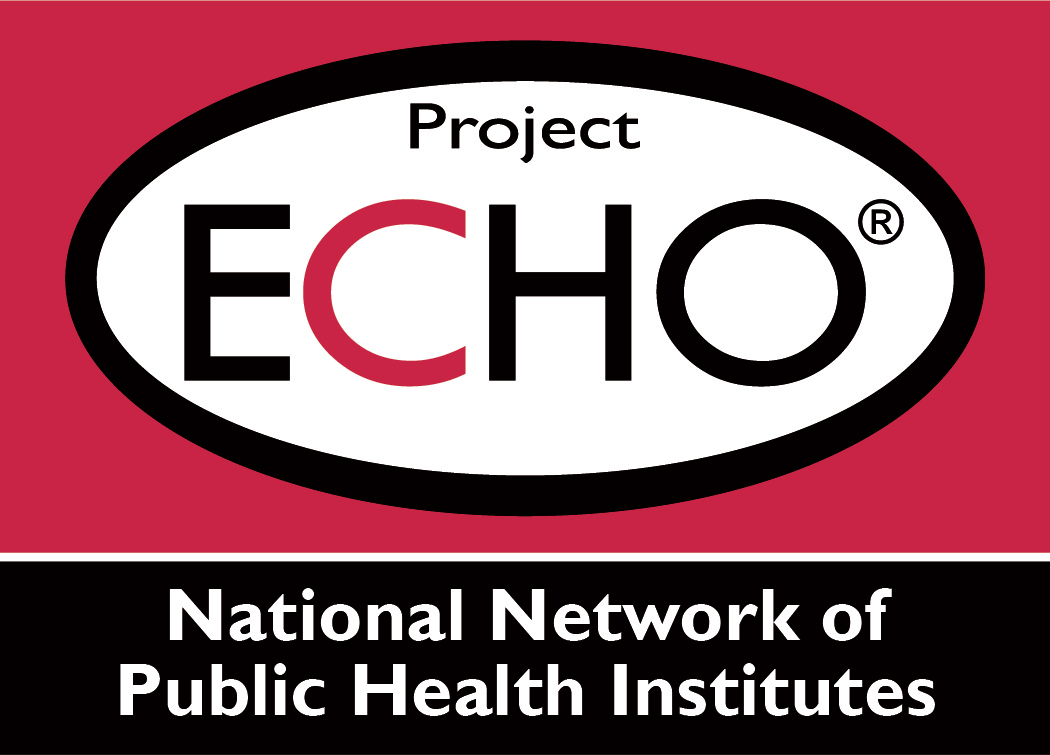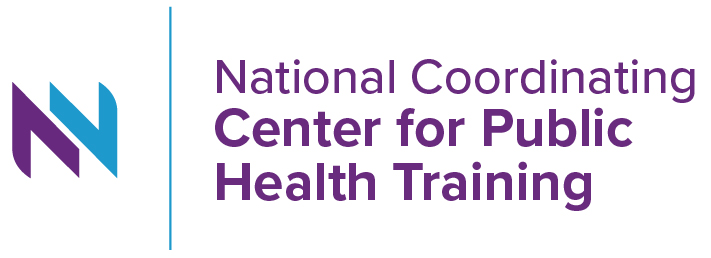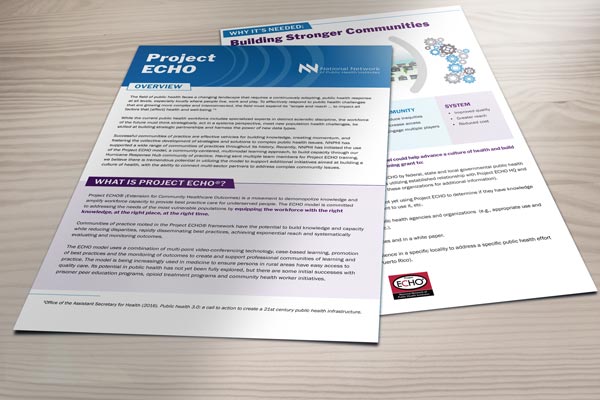Enhancing Communities of Practice: Using Project ECHO to Deepen Skill-Building for the Public Health Workforce
- By: National Network of Public Health Institutes
- Date

 The public health workforce is facing new realities that require professionals to prepare, respond, and adapt to rapidly changing landscapes. To improve health outcomes, the field must expand its “scope and reach … to address all factors that [impact] health and well-being” (Public Health 3.0: A Call to Action to Create a 21st Century Public Health Infrastructure). Currently, the workforce has specialized experts in distinct scientific disciplines (e.g., epidemiology, laboratory sciences, chronic disease prevention), which was an effective approach in the past. However, the workforce of the future must think strategically, act from a systems perspective, and be skilled at building strategic partnerships and harnessing new data types.
The public health workforce is facing new realities that require professionals to prepare, respond, and adapt to rapidly changing landscapes. To improve health outcomes, the field must expand its “scope and reach … to address all factors that [impact] health and well-being” (Public Health 3.0: A Call to Action to Create a 21st Century Public Health Infrastructure). Currently, the workforce has specialized experts in distinct scientific disciplines (e.g., epidemiology, laboratory sciences, chronic disease prevention), which was an effective approach in the past. However, the workforce of the future must think strategically, act from a systems perspective, and be skilled at building strategic partnerships and harnessing new data types.
And yet, the field of public health builds the capacity of its workers largely through “one-off” training events (e.g., single online training), which generally do not allow learners the opportunity to practice new skills in real settings. In order to meet the current and coming challenges, public health practitioners need high-quality, multi-modal and continuous learning opportunities to build meaningful skills.
The Applied Learning Collaborative Approach
The National Coordinating Center for Public Health Training (NCCPHT) at the National Network of Public Health Institutes (NNPHI) utilizes an Applied Learning Collaborative (ALC) model to deepen strategic public health skills and build expertise to address complex issues. Building on the theories of Communities of Practice—defined as “a group of people who share a concern, a set of problems, or a passion about a topic, and who deepen their knowledge and expertise through ongoing interactions”—ALCs are effective vehicles for building practical skills, creating momentum and greater reach in an area of interest or movement, and fostering the collective development of strategies and solutions.
NNPHI’s ALC model embraces action and a commitment to learning by doing. The model also acknowledges that as adult learners, public health professionals need the opportunity to be engaged in the process of discovery and exploration and to practice applying new concepts and skills. Successful ALCs develop a shared repertoire of resources: experiences, stories, tools, ways of addressing recurring problems—in short, a shared practice. They are sustained by creating multiple ways for learners to build professional capital, engage and share information and collaboratively problem solve and test solutions.
“The focus is on implementing best practice to solve the issues that [public health leaders] are having and [understanding] how … we [can] harness any expertise to solve that issue. Allowing people to participate in a community of practice around specific problems of this nature will lift all boats.”
– Dr. Sanjeev Arora, creator of Project ECHO
Expanding with Project ECHO
The NCCPHT is expanding its ALC approach to include the Project ECHO® framework. The Hurricane Response Hub collaborative—a coordinated effort to address hurricane-related health recovery in five jurisdictions affected by the 2017 hurricanes—recently became one of nearly 300 Project ECHO hubs currently operating across the globe. Project ECHO was initially created to support medical education, but is being adapted by other fields, including education and law enforcement.
Through the Hurricane Response Hub, experts at NCCPHT and the Centers for Disease Control and Prevention are supporting five technical assistance centers in Florida, Georgia, Louisiana, Puerto Rico, and Texas that in turn are collaborating with emergency management agencies, education institutions, local government, and several other entities to build disaster-related workforce capacity. The Project ECHO framework provides an ideal opportunity to build sustainable knowledge, skills, and infrastructure for responding to hurricanes and other natural disasters.
In a recent discussion with the NCCPHT team leading the ALC/HRH initiative, Dr. Sanjeev Arora, creator of Project ECHO, described numerous potential uses of the approach in the public health sector, particularly when organizing professionals and agencies around specific goals.
 Dr. Arora explained that the hub-and-spoke Project ECHO model is key for public health, because some health department goals cannot be fulfilled by public health professionals alone and necessitate a coordinated approach. In disaster-related health recovery efforts, the public health professionals are working across agencies and disciplines to respond to challenging health needs, oftentimes in dangerous conditions. Also, the long-term nature of disaster-related health recovery—epitomized by ongoing recovery from Hurricanes Harvey, Irma, and Maria—requires the type of sustained interaction and just-in-time information sharing that takes place through ALCs using tools like Project ECHO.
Dr. Arora explained that the hub-and-spoke Project ECHO model is key for public health, because some health department goals cannot be fulfilled by public health professionals alone and necessitate a coordinated approach. In disaster-related health recovery efforts, the public health professionals are working across agencies and disciplines to respond to challenging health needs, oftentimes in dangerous conditions. Also, the long-term nature of disaster-related health recovery—epitomized by ongoing recovery from Hurricanes Harvey, Irma, and Maria—requires the type of sustained interaction and just-in-time information sharing that takes place through ALCs using tools like Project ECHO.
Dr. Arora noted that NCCPHT’s effort to expand the ALC approach with Project ECHO methodology can result in more rapid improvements in public health than are currently occurring. “The focus is on implementing best practice to solve the issues that [public health leaders] are having and [understanding] how … we [can] harness any expertise to solve that issue,” said Dr. Arora. “Allowing people to participate in a community of practice around specific problems of this nature will lift all boats.”
 Subscribe To Our Communications
Subscribe To Our Communications